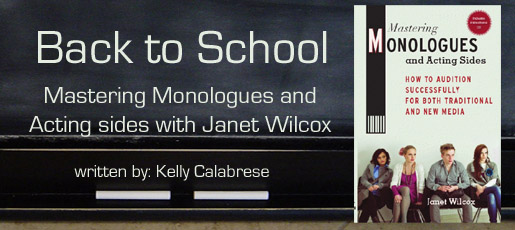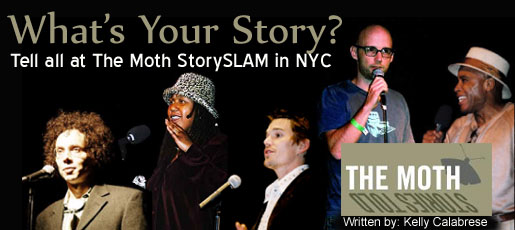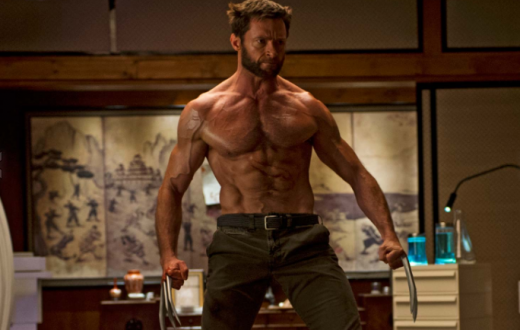School is never out… whether it be for summer, fall or winter… for actors who must always be prepared to spring into auditions!
Learning, “How to Audition Success fully for Both Traditional and New Media” takes constant re-assessment. Luckily, actors have a new tool to help them prep… a book called “Mastering Monologues and Acting sides,” by voiceover industry veteran Janet Wilcox. The book is everything an actor needs to land a great part in today’s rapidly changing performing arts industry.
Janet Wilcox wrote the book primarily because she “was inspired by voice actors and the fact that so much of what they do is a monologue.” And because she “went to the bookstore and saw that acting books haven’t changed much.”
“I wanted to create something that was more modern – a modern guide to the working actor,” shares Janet.
For today’s actors, looking to add extra credit to their auditions, here are some bonus points, beyond the book…
Q&A with Janet Wilcox
 Q: Just like in school, performing a monologue is a lot like taking an exam. The actor often has to sit still through the intense moment, and not let their eyes wander too much. Do you have any helpful tips on how to master this?
Q: Just like in school, performing a monologue is a lot like taking an exam. The actor often has to sit still through the intense moment, and not let their eyes wander too much. Do you have any helpful tips on how to master this?
When you are on camera doing a monologue or scene where you are stationary, in a medium shot, and not moving… as an actor you need to make let your imagination work for you. Create a scenario where you have to be very still. Your character may be in a situation where there is not a lot of movement. Use it to your advantage.
Also, you can move all you want when you rehearse to add colors that will be there for you when you are still. I just had a student for a voice over animation audition – they moved around, did their blocking and then went back to the mic, because you can’t move off mic in voice over.
Q: How can actors learn to get more comfortable with that ‘imaginary spot’ on the wall?
Use it like your fourth wall on the stage, put things there and let your imagination be fluid. It can be a window at one moment. It can be a picture the next moment. The imagination is very fluid so use that as a window for your character in a visualization process.
Also, as long as you are in the make believe world, you are fine. When you leave that, is when all the bad things come up such as… they are not listening to me. Or… I don’t know if I nailed that last line. You have to live in that imaginary world and you are fine.
Q: Many times actors try to be a ‘Jack of all trades’ and perform monologues or sides of all different types. Should an actor focus on a particular type or have a range on hand?
Your type does come into it. Aside from what is dictated – comedic, dramatic, classical and so forth – you want to find something that really shows you off the best. It is finding the characters that are a good match for what you bring to acting. An audience wants to see you as a certain role. When you go against type, you have to prove to us that we want to see you do this character. For example, maybe an actor isn’t someone with a leading character’s looks so they have to overcome that for us to be entranced by their performance. So you may like being a certain role but lay it in a way that we believe it and can see you doing it. It is like the perfect wardrobe. When you wear something you look fabulous in, you feel fabulous.
Q: Your book seems to be a master class in astrology – with many key points about studying the stars. How can an actor learn from an acting pro… viewing them as a study versus entertainment?
Go into it with that mindset that you are watching it to learn. Tell yourself there is going to be a quiz. You say, “I am going to watch this movie to see how this person created this character.” Or, “I am going to see how this actor deals with listening and responding.” Maybe you want to watch them on the phone, which is a real technique thing. That takes a lot of imagination because there is often no one there with you.
Watch for their moment of inspiration.
Q: You mention that actors should grade themselves, record their practice and decide if they should have landed a part? How can an actor do this without bias?
I think distance is a great thing. If you record something, and look at it right away, you are more connected to it. A week later, you have more perspective. As a voice over artist, I have to record and send my auditions out all the time. So, I often listen a week later to see if I still believe it was a good audition.
Q: How can actor’s see their performances as shades of grades versus pass or fail?
Any time you are facing fear, in motion, making acting choices and pushing yourself beyond your comfort zone, you grow. So, you think… Maybe it wasn’t an A, but it will lead to another part that you will book.
After an audition, you could write down all your feelings as a means of remembering the ideas that you want to learn from. But other than that, it is in the past. You have to take away what will help you and not belabor the mistakes you made. Mistakes lead to success. If you learn from them.
Q: When actors have a day of personal tests, one audition after the next, how can they get from say… a C to an A mindset?
Self reflect on what you won’t do again. It’s like when you are on stage and you make a mistake in front of an audience. That is one of the best teachers, because you made a mistake in front of a lot of people. So, again, be a little objective but also take the sports model of shaking it, get rid of that negative thing you did and tell yourself that you are going to do better. A lot of it is psychological.
Also focus on your imaginary reality so you are drawn there and not distracted. It is no different than being on stage. If you go out and are not the character, then the audience will let you know it. Or, at least you feel it.
 Q: Just like in the classroom, auditions have incorporated many new styles of multimedia. How has the Internet changed auditions?
Q: Just like in the classroom, auditions have incorporated many new styles of multimedia. How has the Internet changed auditions?
I am a voice actor and we’ve been dealing with that for quite some time now. It does take a lot of energy to juggle everything. For example, taping your own auditions for an actor is difficult. Perhaps you find a friend to help you. Staying on top of industry trends in important and you have to learn to adapt your skills to the medium. Improv skills can come in handy for webisodes. Everything is becoming tech savvy. I think it is good to have a network of people and support systems that will help you stay abreast of the new trends.
Q: You create a real classroom setting in your book. What were your reasons behind that?
The reason why I created a classroom setting is because I have taught online education and online education is based on students working at their own pace. Also, people in all parts of the country can benefit from a class taught in Los Angeles and New York by having contributors from both costs.
Q: When an actor is learning from a book, versus a class, how do you recommend they best absorb the material? A chapter a day and let it soak in? As much as they want? Etc?
There are two methods to do this book. One is to take the chapters in at your own pace. The other is to select material that is needed for your immediate audition needs. It is both linear, with building blocks of knowledge, but you can pick and choose what you need when reading it.
And, if possible, do exercises and record them. Because then, they can be a bit more objective with exercises.
Q: What inspirational advice schooled you, personally, the most?
You have to believe that you’re sharing something important with others. And really love acting. Creative plays and scripts help people make sense of their lives and you are helping people by being an entertainer. You are giving a lot of yourself, but don’t forget to take care of yourself too.
Q: What would be your CliffsNotes advice on how to not freak at auditions?
It is a play, so play! It really is about enjoying the make-believe and the play of it. It’s fun. Have fun. So many people are accountants. This is the most fun you can have. You have to allow yourself the ability to enjoy it. The hard thing for actors is that they have to support themselves as well, while they are doing it. That is the challenge. But give yourself permission to take that time. You’ve earned it!
Earning… is certainly what this acting world is all about. What you put in – you get back!
Thank you to Janet Wilcox for her time!
Mastering Monologues and Acting sides – is available for pre-order on Amazon and allworth.com
The Official release is Oct 4th. Come to the book signing… and see monologues performed.
The New York book signing and reading will be on Saturday, October 22nd at Actors Connection from 2:30 to 4:30. (Actors Connection630 Ninth Avenue, Suite 1410 – between 44th & 45th)
The L.A. Book Signing: October 13th from 7PM-9PM (Book Soup 1818 Sunset Blvd. W. Hollywood, CA)







